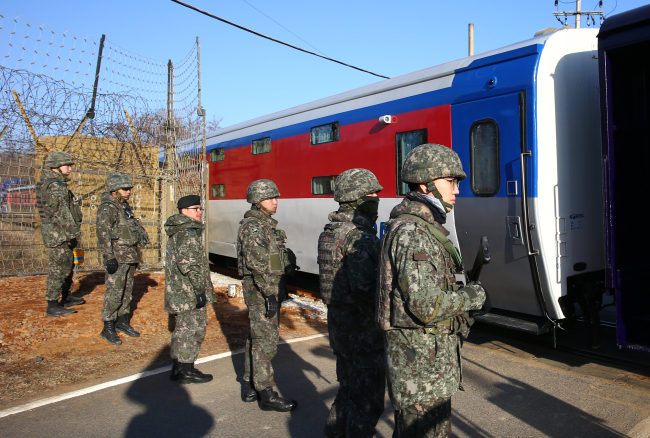2019 budget for inter-Korean projects exceeds $890m
By Jung Min-kyungPublished : Dec. 10, 2018 - 15:44
South Korea’s budget allocated for inter-Korean projects next year has exceeded 1 trillion won ($890.7 million) for the first time since 2016, the Ministry of Unification said Monday.
A total of 1.1 trillion won has been earmarked for the inter-Korean cooperation fund in 2019, which is 15 percent higher than the 959.3 billion won set aside for 2018, the ministry said in a report. The ministry noted that this is the first time in three years that the fund has risen to over 1 trillion won.
A total of 1.1 trillion won has been earmarked for the inter-Korean cooperation fund in 2019, which is 15 percent higher than the 959.3 billion won set aside for 2018, the ministry said in a report. The ministry noted that this is the first time in three years that the fund has risen to over 1 trillion won.

“With the cooperation of the National Assembly, (the government) was able to secure next year’s budget (for the inter-Korean cooperation fund) to implement the Panmunjom Declaration smoothly with financial support,” the report said. It added that the budget was drawn based on the potential development of “sustainable inter-Korean relations” and peace on the Korean Peninsula, next year.
South Korean President Moon Jae-in and North Korean leader Kim Jong-un met at the truce village of Panmunjom in April, where they announced a set of agreements aimed at bringing peace on the peninsula and fostering cross-border ties. They have met two more times, in May and September, so far.
For inter-Korean economic projects, including plans to modernize cross-border railways and roads, 309.3 billion won was set aside in the form of grants and 119.7 billion won in loans. Last year, 248 billion won was allocated for grants and 20 billion won for loans. The increase indicates that the Seoul government hopes to make significant progress in the railway and road project next year.
The ministry stressed that the projects would be pursued within the framework of international sanctions against North Korea and with close cooperation with members of the international community.
A total of 39.5 billion won will be spent on reunions of families separated by the 1950-53 Korean War. This is a 229.2 percent increase from 2018’s allotment of 12 billion won, as Seoul hopes to hold as many reunions as possible due to the old age of the family members. The money is expected to be used to renovate and restore venues for the reunions and to develop communication programs, such as video calls between the separated families.
For inter-Korean forestry cooperation, 113.7 billion won is planned to be used, higher than the previous 30 billion won.
While the budget for inter-Korean projects increased overall, the Unification Ministry’s general budget will decline 3.4 percent to 219.8 billion won. A delay in the launch of a human rights foundation and a decline in the number of North Korean defectors in South Korea are the main reasons, according to the report.
Under the North Korean Human Rights Act, which took effect in 2016, the government pushed to establish an organization tasked with improving the North’s dire human rights situation, but its board has not been formed yet.
On Saturday, South Korea’s parliament passed a 469.6 trillion won government spending plan for next year.
South Korea set up the inter-Korean cooperation fund in 1991 for cross-border projects that promote ties and exchanges between the two Koreas.
By Jung Min-kyung (mkjung@heraldcorp.com)








![[Graphic News] More Koreans say they plan long-distance trips this year](http://res.heraldm.com/phpwas/restmb_idxmake.php?idx=644&simg=/content/image/2024/04/17/20240417050828_0.gif&u=)
![[KH Explains] Hyundai's full hybrid edge to pay off amid slow transition to pure EVs](http://res.heraldm.com/phpwas/restmb_idxmake.php?idx=644&simg=/content/image/2024/04/18/20240418050645_0.jpg&u=20240419100350)






![[From the Scene] Monks, Buddhists hail return of remains of Buddhas](http://res.heraldm.com/phpwas/restmb_idxmake.php?idx=652&simg=/content/image/2024/04/19/20240419050617_0.jpg&u=20240419175937)

![[KH Explains] Hyundai's full hybrid edge to pay off amid slow transition to pure EVs](http://res.heraldm.com/phpwas/restmb_idxmake.php?idx=652&simg=/content/image/2024/04/18/20240418050645_0.jpg&u=20240419100350)

![[Today’s K-pop] Illit drops debut single remix](http://res.heraldm.com/phpwas/restmb_idxmake.php?idx=642&simg=/content/image/2024/04/19/20240419050612_0.jpg&u=)